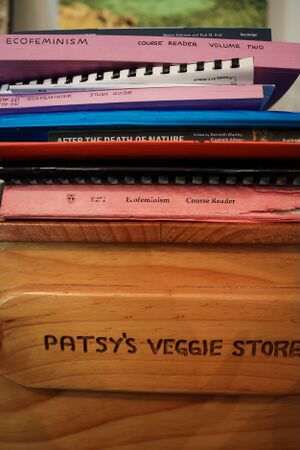Main Page
CODE2025 - this is here so we know where to go it can be a private page eventually / for sharing
Contemporary Ecofeminist Education CEE
A transdisciplinary Contemporary Ecophilosophy Syllabus addressing complex issues with intergenerational communities, to learn, expand & build.

Contemporary Ecofeminist Education CEE is a research led pedagogical initiative that investigates, analyses, reads, listens, and performs some of the legacies of Ecofeminism.
This continuity is rooted in the influential work of Patsy Hallen (1944-present), who pioneered Australia’s first Environmental Ethics (1981) and Ecofeminism (1991) courses at Murdoch University.
CEE seeks to adapt the texts of this foundational curricula into nano-credentials tailored for 21st-century learners, thinkers, makers, add /your noun here. The particular push, pull, reach yield, also foregrounds the tacit nature of artistic sensibilities and diverse embodied knowledges into practice in these nano cred series of responses to the readers (and beyond).
The gifting of the hardcopies of Course Readers by the ecophilosopher Geoff Lumis to Jo Pollitt who then in turn reciprocally shared the repository with her peers, Nancy Mauro-Flude. Maitland Schnaars, and Kavita Naidu in 2022.
This propelled an ongoing iterative and a responsive project initial begun as Performing Ecofeminist futures supported by Centre for People Place Planet. This seeded the ground for the development of CEE.
CEE is grounded in critical questions: What frameworks, theories, and methodologies activate, support, hinder, reveal, and/or erase ecofeminist knowledge systems?
The inquiry extends into a transdisciplinary approach that considers the aesthetic relationship of feminism, environmentalism, and decolonial perspectives as connected forces within ecofeminism.
This standpoint enables us to address complex issues cooperatively, fostering learning environments that consider art as a valuable medium to thoughtfully adapt to emerging ecological and societal challenges. We envisage to codesign nano creds and CEE syllabi as part of a community of commons and set up platforms and Local Archives that are able to build in an iterative way for future co-creations and resilient participatory practices, somatic explorations and digital caretaking.
A core focus of CEE is the integration of Southern Oceanic Palawa and Noongar Indigenous Knowledge Systems (IKS). Recognising IKS as foundational, CEE highlights the importance of knowledge-sharing practices rooted in place and relationality, contrasting with extractive neocolonial digital frameworks.
Embracing a web of relations, the researchers of CEE emphasises practices that honour local contexts and seek to dissolve traditional hierarchies, building an inclusive space for marginalised and queer groups. Guided by ecofeminist and decolonial thought, CEE pedagogies also critique the universality assumed by certain digital technologies and their impact on local knowledge systems through self-determined holistic practices and processes of context-based knowledge transmission.
Consult the User's Guide for information on using the wiki software.